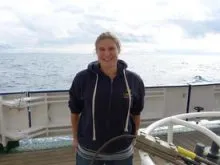
Group
Marine Ecosystem Processes
Site
Southampton
Email
a.lichtschlag at noc.ac.uk
I am a benthic biogeochemist in the OceanBiogeosciences Group (OBG) and I lead the Marine Ecosystem Processes (MEP) Subgroup. My research centres around the biogeochemistry of marine sediments and sediment-water exchange processes with a focus on connections between different element cycles, e.g. the carbon, sulphur, metal and nutrient cycles and the drivers of early diagenetic processes. My main research goals are to better understand the impact of external stressors (natural and anthropogenic) on the benthic environment. My recent work in the UKRI Future Leaders Fellowship "Sandman" focusses on the development of new technologies and approaches to autonomously measure porewater gradients and benthic-pelagic exchange fluxes to improve our understanding of the marine biogeochemical cycling, especially in undersampled and more challenging coastal and marine environments.
Topics of interest include:
- Biogeochemical processes in coastal sediments, with a focus on the carbon, nutrient and metal cycles and sediment-water exchanges
- Development of new technologies for benthic biogeochemistry and sediment-water fluxes
- Fluid-sediment interactions and biogeochemical alterations in deep and shallow hydrothermal sediments and cold seeps
- Biogeochemical and ecological impact and monitoring strategies for seepage from sub-seafloor CO2 and H2 storage
Bibliography
- since 2023 Lead of Marine Ecosystem Processes Subgroup (OceanBiogeosciences Group)
- since 2016 Senior Researcher, NOC Southampton
- 2012–2016 Postdoctoral Research Associate, NOC Southampton
- 2009–2012 Postdoctoral Research Associate, Max-Planck-Institute for Marine Microbiology, Bremen, Germany
- 2005–2009 PhD Research Associate, Max-Planck-Institute for Marine Microbiology, Bremen, Germany
- 1997–2005 Diplom (equivalent to MSc) in Geology and Palaeontology, Friedrich-Alexander-University Erlangen-Nuremberg, Germany
Benthic biogeochemistry, in situ technology, diagentic processes in sediments, hydrothermal vents and cold seeps, CCS and Hydrogen storage, human impacts on marine biogeochemical cycles
Lead of Marine Ecosystem Processes Group (Marine Science)
since 2023 Member of the NERC Peer Review College
since 2019 Co-organizer of “Gas in Marine Sediments” Conferences (GIMS)
since 2023 Member of the Advisory Board for “AWI Marine Stations”
since 2014 Member of UK Carbon Capture and Storage Research Centre (UKCCSRC)
2016–2022 Associate Editor for Journal “Continental Shelf Research”
2018–2021 Scientific Evaluation Committee "Functioning of fluid and solid Earth" for French National Research Agency (ANR)
Active Projects (2026)
Sandman – A novel technology to understand environmental changes in marine sediments (2024-2028): UKRI Future Leaders Fellowship to develop new technologies and approaches to better understand and quantify benthic biogeochemical processes in marine sediments and to monitor and counteract anthropogenic impacts on the seafloor
ATLANTIS – Atlantic Climate and Environment Strategic Science (2024–2029): Atlantis is NOC’s strategic program to enhance the long-term, large-scale ocean observation systems and the ocean value-chain that contributes to key national and international programmes and priorities. The aim of the programme is to provide evidence, tools and knowledge to support the ambition for healthy, biologically diverse and resilient marine environments, a sustainable blue economy and communities safe from natural hazards
FOCUS – Future states of the global coastal ocean: understanding for solutions (2022–2026): The aim of this (Inter-)National Capability project is to develop global understanding of the impacts of climate change and direct human activities on the coastal ocean at the regional to local scale of human interaction, Co-I, WP lead
MOET – Managing the environmental sustainability of the offshore energy transition: a solutions-based approach (2021–2027): MOET will assess the environmental sustainability of offshore wind, blue and green hydrogen, and carbon capture and storage for selected test areas of the UK offshore, and will develop solutions for planning the technology and infrastructure of the offshore energy transition. It will also assess public understanding and acceptance of those technologies
ULTRA – Ultramafic-hosted mineral Resource Assessment (2020–2025): NERC Highlight Topic to study ultramafic-hosted seafloor massive sulphides deposits at the Semenov vent field at the Mid-Atlantic Ridge, Co-I
Previous Projects while at NOC
At-Sea – Autonomous techniques for anthropogenic structure ecological assessment (2021–2024): At-Sea is a part of the NERC-funded INSITE programme and trials the concept of using autonomous submarines for high-tech, low-impact monitoring to pick up any potential environmental impacts at these industrial sites, Co-I
A novel approach to measure nutrient fluxes in permeable sediments (2022–2023) – NERC Exploring the Frontiers, PI
A novel approach to measure nutrient fluxes in permeable sediments (2022–2023) – NERC Exploring the Frontiers, PI
FLYING NODES – Sensor enabled seabed landing AUV nodes for improved offshore Carbon Capture and Storage (CCS) monitoring, UKCCSRC Flexible Funding, (2021-2022), PI
HADAL SENSORS – New capabilities for measuring organic matter degradation in the deepest oceans on Earth (2020–2022), NERC Seedcorn, PI
STEMM-CCS – Strategies for environmental monitoring of marine Carbon Capture and Storage (2016–2021), EU H2020, Co-I
CHIMNEY – Characterisation of major overburden leakage pathways above sub-sea floor CO2 storage reservoirs in the North Sea, NERC Highlight Topic, (2016–2021)
LOCATE – Land-Ocean Carbon Transfer, NERC National Capability Program, (2016–2021)
ETI project – Measurement, Modelling and Verification of CO2 Storage, (2015–2017), Co-I
QICS – Quantifying and Monitoring Potential Ecosystem Impacts of Geological Carbon Storage, NERC, Directed Research Program (2010–2014)
ECO2 – Sub-seabed CO2 Storage: Impact on Marine Ecosystems, (2011–2014), EU FP7